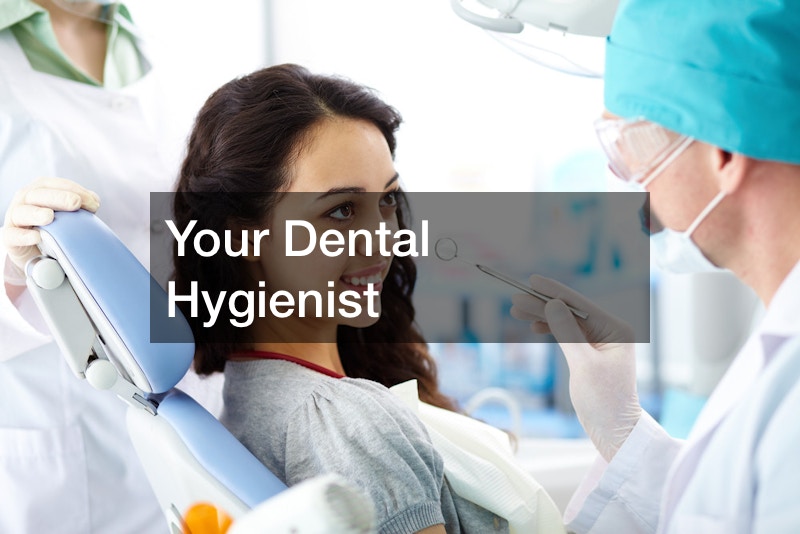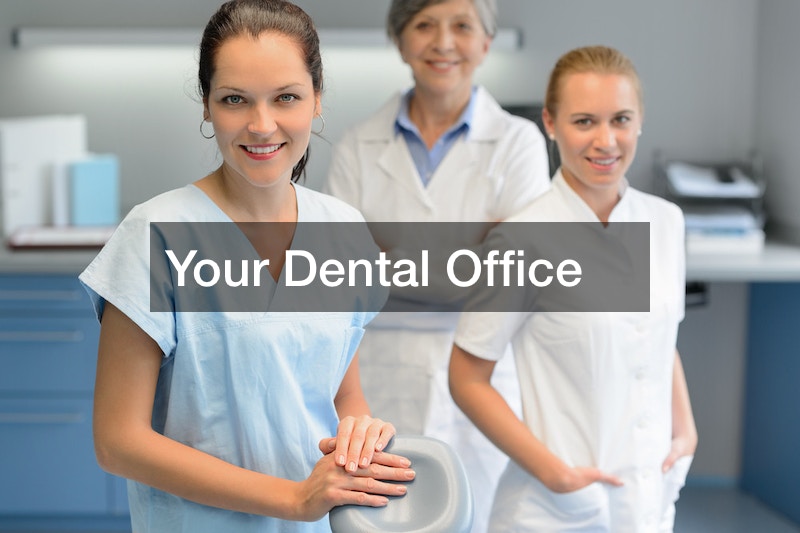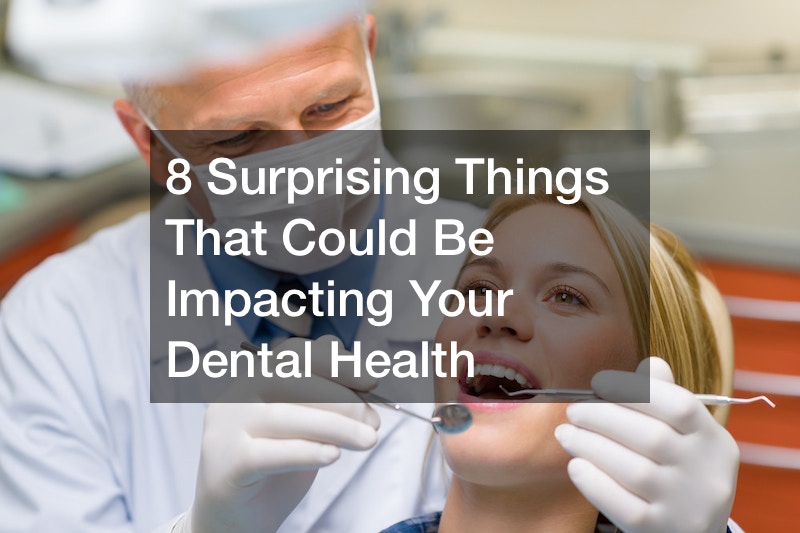
Good dental hygiene is integral to maintaining healthy teeth and gums, but there are several unexpected factors that could be impacting your dental health. While most people are aware of the importance of brushing and flossing regularly, they may not realize that other aspects of their lifestyle and healthcare can also play a significant role in the health of their teeth and gums. In this article, we will explore surprising things that could be impacting your dental health.

1. Your Dental Hygienist
Gum disease is a common dental problem that affects many people. It occurs when the gums become inflamed due to the buildup of plaque and tartar, which can lead to tooth loss if left untreated. Regular check-ups with your dental hygienist are important because they can check your gums for signs of gum disease and recommend appropriate treatment if needed.
If your dental clinic lacks a dental hygienist, this could be a red flag that the office is not providing adequate dental care. A dental hygienist is an important member of the dental team who cleans teeth, removes plaque and tartar, and checks for signs of gum disease. You may not receive the same level of care without a dental hygienist as you would at a dental office with a full dental team.
It’s important to ensure that your dental hygienist is checking your gums for signs of gum disease during your regular dental check-ups. If they’re not, it may be worth asking why or considering finding a different dental office that provides more thorough dental care. Work closely with your dental hygienist and following their advice, you can prevent gum disease and maintain good dental health.

2. Your Dental Office
The quality of dental care you receive from your dental office can significantly impact your dental health. It pays to choose a dental office that prioritizes cleanliness, patient education and empowers you to take control of your dental health. Good dental services should take the time to explain your dental problems, treatment options, and preventive measures you can take to maintain good dental health. If your dental office is not providing you with this level of education and support, it could be a red flag that you’re not receiving adequate dental care.
Moreover, regular X-rays should be done during dental check-ups, as they can detect dental problems that may not be visible to the naked eye. According to the American Dental Association, X-rays can detect cavities, gum disease, and other dental problems in their early stages, allowing for more effective treatment. If your dental office is not performing X-rays regularly according to your dental health needs, it could be a red flag.
In addition to regular X-rays, your dental office should also be using advanced imaging technology to improve diagnosis and treatment planning. 3D imaging technology, for example, can provide more detailed images of your teeth and jaw, allowing for more accurate treatment planning. If your dentist is not investing in the latest technology and equipment, it may be a sign that they are not providing the best possible dental care.

3. Skipping Your Cleanings
Dental cleanings are an important part of maintaining good oral health because they remove plaque and tartar buildup from teeth and gums. A family dental care or dentist will typically use special instruments to scrape and remove plaque and tartar from the teeth, particularly in hard-to-reach areas. The teeth are then polished to remove any remaining stains or debris and to smooth out the tooth surfaces, which can aid in the prevention of future plaque buildup. The final step is usually a fluoride treatment, which strengthens the teeth and prevents decay.
Regular visits to general dentists or dental cleanings service are necessary for good oral health and the prevention of dental problems. Skipping dental cleanings can result in plaque and tartar buildup on teeth and gums, which can lead to gum disease, cavities, and even tooth loss. Gum disease, in particular, is a common dental issue that can lead to more serious health problems like heart disease, stroke, and diabetes. Furthermore, regular dental cleanings can aid in the early detection of dental problems, making them easier and less expensive to treat. In short, skipping dental cleanings could be the cause of your hidden trigger.

4. Your Alcohol Intake
Alcohol intake can have several negative impacts on dental health. According to a study published in the Journal of Periodontology, heavy or craft alcohol consumption can increase the risk of periodontitis, a severe gum disease that can lead to tooth loss. The study found that individuals who drank heavily had more significant bone loss in the jaw and deeper periodontal pockets than those who did not drink or consume alcohol in moderation.
Moreover, alcohol consumption can lead to dry mouth, which can increase the risk of tooth decay and gum disease. Saliva plays a crucial role in maintaining oral health by neutralizing acid produced by bacteria in the mouth and washing away food particles that can lead to plaque buildup. When there is not enough saliva in the mouth, harmful bacteria can thrive, leading to dental problems.
It’s worth noting that even moderate alcohol and craft beer consumption can have negative effects on dental health. A study published in the Journal of Dentistry found that consuming alcohol regularly, even in moderation, was associated with an increased risk of dental erosion. Dental erosion can lead to sensitive teeth, discoloration, and even tooth loss over time. Therefore, it’s essential to limit alcohol intake and practice good oral hygiene habits, such as brushing twice a day and flossing daily, to maintain good dental health.
5. Your Health Insurance
In several ways, your health insurance policy can be an unexpected danger signal for your dental health. First, some policies may not provide any dental coverage at all or may limit coverage to specific procedures or specialists. This can make it difficult for patients to obtain necessary dental care, which can lead to untreated dental problems that worsen over time. Patients may be hesitant to seek care if they do not have insurance coverage, which can lead to further delays in treatment.
Furthermore, using employee health insurance for dental services can be complicated and perplexing. Many dental offices require payment upfront and then submit a claim to the insurance provider on behalf of the patient, which can result in delays or denials of coverage. Some policies may also require pre-authorization for certain procedures or have limitations on the number of visits allowed per year. These restrictions can make it challenging for patients to receive the care they need, especially if they have complex or ongoing dental problems.
Finally, even if your health insurance policy includes dental coverage, it may not be adequate for your requirements. Some policies may only cover routine preventive care like cleanings and checkups, while others may have high deductibles or copayments for more advanced treatments. Patients may find it difficult to afford necessary procedures, or they may be forced to choose between different treatment options based on cost rather than effectiveness.
It is critical to carefully review the details of your health insurance policy and, if necessary, look into options for additional dental coverage. Regular dental checkups and cleanings can help prevent dental problems and catch issues early, saving money and preventing more serious health problems down the road. Don’t let unexpected surprises in your health insurance policy be a red flag for your dental health.
6. Your Hormone Levels
Hormone levels can have a surprising impact on dental health. Changes in hormone levels during puberty, pregnancy, and menopause can increase the risk of gum disease and other dental problems. Those with Polycystic Ovary Syndrome ( PCOS), a hormonal disorder that affects up to 10% of reproductive-age people with ovaries, are at an increased risk of periodontal disease due to higher levels of androgens.
According to studies, those with PCOS are three times more likely than those without the condition to develop periodontal disease. This increased risk is thought to be related to PCOS’s hormonal imbalances, which can cause inflammation and other immune system changes that affect the gums. In addition, those with PCOS may be more likely to have other risk factors for gum disease, such as insulin resistance.
If you have PCOS or other hormonal imbalances, you must pay special attention to your dental health. This includes practicing good oral hygiene habits like brushing and flossing on a regular basis, as well as visiting your dentist for regular checkups and cleanings. To manage gum disease and other dental problems, your dentist may also recommend additional treatments such as deep cleaning or antibiotic therapy.
7. Your Gut Health
Maintaining good gut health is essential for good dental health. According to research, the health of your gut microbiome is related to the health of your mouth, teeth, and gums. When the gut microbiome is out of balance, the risk of cavities, gum disease, and other oral health issues increases. As a result, it is critical to understand how to keep your gut healthy in order to promote overall health.
A healthy diet is one way to maintain good gut health. A diet high in fruits and vegetables, whole grains, and lean proteins promotes healthy gut bacteria and lowers the risk of dental problems. Additionally, consuming probiotics and prebiotics, which can be found in foods such as yogurt, kefir, garlic, onions, and bananas, can also help promote the growth of beneficial bacteria in the gut. By supporting good gut health through a healthy diet, we can also promote good oral health.
Certain conditions, such as irritable bowel syndrome (IBS), Crohn’s disease, and celiac disease, could be the unnoticed causes of your dental issues. If you have any of these conditions, you should visit your medical wellness clinic and dentist to ensure you’re taking the necessary steps to maintain good oral and gut health. Furthermore, a variety of systemic health issues, such as heart disease, diabetes, and obesity, have been linked to poor gut health. These conditions have also been linked to an increased risk of dental problems, emphasizing the importance of gut health.
8. Medications and Supplements
Medications and supplements can have unexpected impacts on your dental health. Certain medications, such as antidepressants, antihistamines, and blood pressure medications, can cause dry mouth, which can lead to an increased risk of tooth decay and gum disease. A dry mouth occurs when there is a reduced amount of saliva in the mouth, and saliva plays an important role in neutralizing acids produced by bacteria and washing away food particles that can cause tooth decay.
Besides, calcium-channel blockers, which are used to treat high blood pressure and angina, have been linked to an increased risk of gum disease. These medications can cause gums to overgrow and form pockets that are more difficult to clean, leading to bacterial buildup and, eventually, gum disease. If you are taking a calcium-channel blocker, it is critical that you practice good oral hygiene and see your dentist on a regular basis for cleanings and checkups.
Supplements, in addition to medications, can have an impact on your dental health. Vitamin C and calcium, for example, are essential for maintaining healthy teeth and bones, while probiotics can help to balance the bacteria in your mouth. However, taking excessive amounts of certain supplements can have a negative impact on dental health. High doses of vitamin C, for example, can erode tooth enamel, whereas high calcium intake can result in kidney stones. If you take supplements, consult your dentist or doctor about any potential effects on your dental health, and stick to the recommended dosages to reduce the risk of negative side effects.
Maintaining good dental health is important for overall health and well-being. Pay attention to potential red flags like dental office practices, alcohol intake, and hormone levels, we can take proactive steps to protect our teeth and gums. Prioritizing good dental hygiene and overall health will lead to a happier, healthier life.

